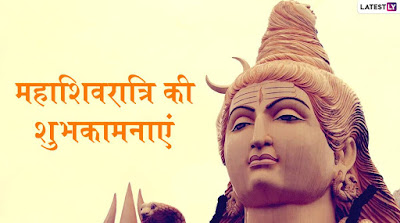Maha Shivaratri or Padmarajatri reminds us to overcome darkness and
ignorance in life and in the world. This year's Maha Shivaratri 2020
festival falls on Friday, February 21st.
Maha Shivaratri 2020: Maha Shivaratri is a major festival celebrated
annually in Hinduism, in honor of Lord Shiva, also known as
'Padmarajatri' and 'Shiva's Great Night'. Today, devotees worship Lord
Shiva, practice fasting, and perform various religious activities to
please Lord Shiva. Devotees believe that by presenting Shankar on Good
Shivratri day, one can get rid of past sins and attain moksha or
salvation.
Today marks the overcoming of darkness and ignorance in life and in the
world. Maha Shivaratri is known as the anniversary of the cosmic dance
performed by Lord Shiva.
This year's Maha Shivaratri 2020 festival falls on Friday, February
21st.
Shivaratri is celebrated on the 14th day of each month, one day before
the new moon. Of the 12 Shivaratri celebrations of the year,
Mahashivaratri is the most important, usually celebrated in February or
March.
According to Maha Shivaratri, Drokpanchang, Friday, February 21, 2020.
- Ish Nishita Kal Puja Time - 12:27 AM to 01:17 PM, 22 February • (Duration - 00 hours 49 minutes) February 22nd,
- Shivaratri Parana Time - 07:03 am to 03:47 pm •
- Night First Prahar Pooja Time - Noon 06:41 to 09:46 •
- Second Prahar Pooja time of the night - February 09:46 to 12:52 pm •
- Night 3rd Prahar Pooja Timings - 12:52 AM to 03:58 PM, 22 February •
- Fourth Prahaar Pooja Timings of the Night - 03: 5 PM AM 03:03 PM, 22 February •
- Chaturdashi Titi begins - February 21, 2020 at 05:20 PM •
- Chaturdashi date ends - 2020, 22, 0 on: 02 noon
On Maha Shivaratri, devotees rise before sunrise and take baths in the
sacred waters of the Ganga River. Afterwards, the devotees go to the
nearest Shiva temple, dressed in new clothes, and perform six kinds of
jalasheks, including milk, yoghurt, honey, ghee, sugar and water, which
is an important part of the Shivratri. Some devotees, some put jute.
Thereafter, devotees offer Akshat, Abir, Gulal, etc. in the Shiva
Lingam. They also offer white flowers and lotus flowers. Satan's
trumpets (Dhatura flower) and Bilva Patra (Belpatra) offer 108, 1108
Belpatras to Lord Shiva. To cool the hot-cold goddess, some bilva leaves
are placed on top of the shivling. It is believed that Lord Shiva
blesses the devotee with any form of devotion for a triple hour.
Devotees also offer incense sticks, light lamps, white cloth, sweets,
any five, fruits and cakes.
The worship of Lord Shiva on Maha Shivaratri continues till day and
night. In the evening, take a bath again before heading to the temple
for the Shivalinga Puja.
Devotees who cannot visit the temple for a
reason can worship at home. Devotees stay awake, chanting 'Om Nama
Shivaya' in the Shivalayas and singing hymns and hymns praising Lord
Shankar.
Devotees offer prayers to Lord Shiva the next morning on Maha
Shivaratri. Unmarried women pray for a husband like Shiva, who is
considered an ideal husband, while married men pray for Maha Shivaratri
to protect their husbands and sons.
Maha Shivaratri 2020: The Fasting Story
According to Sivapuran, there was a king named Sundareseena. Once he
went hunting in the forest with his dogs. When the animals could not be
found even after working hard all day, they reached the shore of a
reservoir at night with hunger and thirst.
He saw Shivalinga with some
leaves there. He removed the foliage from the Shiva Linga and cleaned it
of dust. Devotion led to the nightly awakening of the king. In the
morning Nishad Raja went to his house and got hungry.
Later, when he died, Yamaraj's messengers tied him in a loop and took
him to Yamlok, where Shivaji's armies fought Yamadut and were freed from
the loop. In this way, Nishad joined Lord Shiva's beloved Ganesha.
The story behind Maha Shivaratri
According to Hindu mythology, from the birth of Lord Shiva to the
marriage of Neelkanth Purana and Parvati Devi, there are many stories
and beliefs about why we celebrate Mahasivaratri.




Comments
Post a Comment